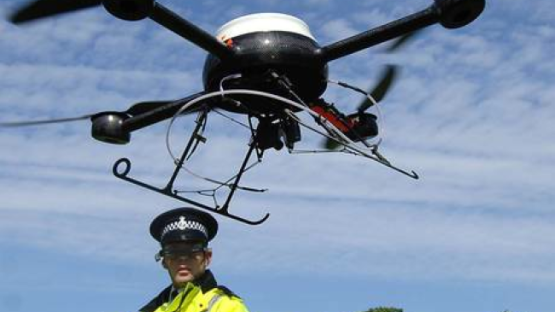Police drones in the UK? Watch this airspace…

Drones are back in the headlines, with the news that the Ministry of Defence plans to develop unmanned underwater vehicles for use in submarine warfare. Human rights groups have already raised concerns over the UK’s use of airborne military drones, which have played a key role in UK operations in Afghanistan since 2008. But drone technology is not limited to military uses: the deployment of ‘civilian’ drones, designed for use in home airspace, may be an emerging trend in UK policing.
Latest figures from campaign group Big Brother Watch show that 115 permits to fly lightweight Unmanned Aerial Vehicles (UVAs) were issued by the Civil Aviation Authority (CAA) between January 2009 and October 2011. These vehicles, weighing 20kg or less and similar in size to radio-controlled model aircraft, may be used to monitor crowds at large public events, deter antisocial behavior or provide covert surveillance as part of a criminal investigation.
Moves to streamline the introduction of UVAs into the policing repertoire of US Law Enforcement Agencies are well-documented thanks to advoacy efforts of the ACLU and the EFF's nationwide FOI campaign. However, the future of civilian drones in the UK remains uncertain. While at least four constabularies have purchased or trialed UVAs, they report mixed results in use. A spokesperson for Essex Police told the Independent that their drone has hardly been used, as the force decided it wasn’t worth the money. British Transport Police were said to have trialled a drone, but decided not to purchase it. Kent Police have stated that they have been exploring the use of drones as a form of surveillance but have denied actually implementing the technology. When a drone used by Merseyside Police malfunctioned and landed in a river, a spokesperson declared that the force had since decided not to purchase any more drones because of ‘operational issues.’
At the same time, there have been multiple reports of drone deployment as part of a package of intense security measures surrounding the London 2012 Olympics. However, those running the security operation, including the Met Police, have not been forthcoming about the use of drones. A police source, who has an understanding of drones and similar surveillance technology, said:
"Surveillance drones are not very high up on our priority list...they tend to be quite pricey and require a huge amount of training."
Despite these comments, rumours about the use of unmanned drones at the Games continue.
Concerns have already been raised about the safety of using drones above a crowd or in a built-up area, as a crash landing is more likely to lead to injuries on the ground. One expert in aviation computing has pointed out that, while the the software onboard commercial planes flying in UK airspace must be certified, no such safeguards exist for the complex software used to operate drones, prompting questions about reliability and quality assurance. But as civilian drone technology becomes more sophisticated, safer and easier to use, this kit may well become commonplace in UK police operations.
If it does it will raise serious concerns around the potential for abuse, and campaigning groups will want to know what steps police are taking to prevent individuals’ privacy being infringed without good cause. At this stage however, there is not enough information in the public domain to understand the role drones currently or will soon play in policing, and whether necessary checks and safeguards are being developed at the same time. Do you think you may have spotted UVA? Get in touch with us to contribute to Privacy International’s ongoing investigation into policing drones.



